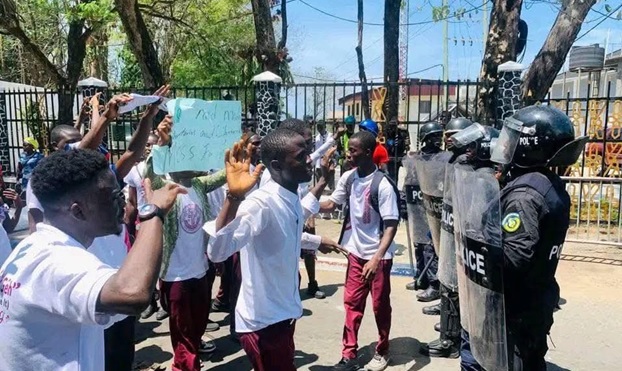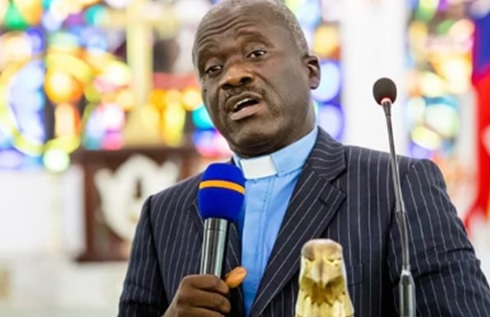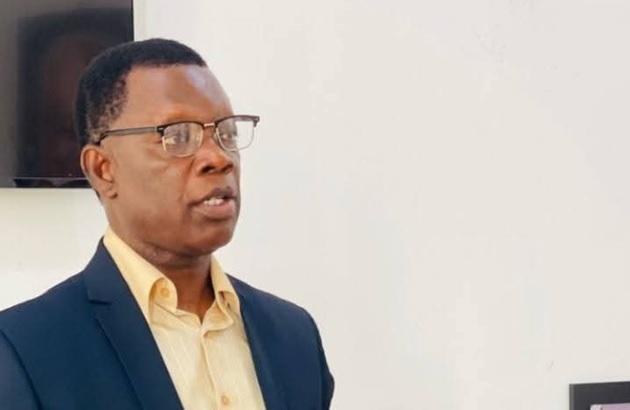MONROVIA, LIBERIA – What began as a peaceful student protest escalated into chaos on Tuesday, March 25, 2025, when officers of the Emergency Response Unit (ERU) of the Liberia National Police fired teargas at unarmed students of the Monrovia Consolidated School System (MCSS). The students, demanding that their teachers be placed on the government payroll, blocked the road between the Capitol Building and the Executive Mansion, bringing traffic to a standstill.
The violent police crackdown has sparked public outrage, with many questioning the government’s commitment to education and the protection of students. Images of teenagers gasping for air and fleeing in panic have flooded social media, intensifying calls for accountability. Witnesses say several students were beaten and forcibly removed from the protest site.
For two weeks, students have been rallying across Monrovia in solidarity with their striking teachers, who are demanding fair wages, full employment for volunteers, and long-promised salary adjustments. Holding placards and chanting slogans, the students argue that quality education is impossible if teachers continue to work without proper compensation.
The crisis intensified on Monday, March 24, when students of William V.S. Tubman High School staged a march through central Monrovia, demanding action. By Tuesday, the protests had swelled into a city-wide movement, with students warning they would extend their demonstrations to private schools if the government failed to meet their demands.
Adding further pressure, the University of Liberia’s Student Progressive Alliance (PROSA) has joined forces with the MCSS students. PROSA leaders condemned the government’s inaction, emphasizing that a functioning education system is essential for national development. “How can Liberia move forward when teachers are paid $150 a month while politicians drive luxury cars?” a PROSA representative asked.
As anger mounts, critics point to what they call the government’s misplaced priorities. The administration of President Joseph Boakai has come under fire for allocating millions of dollars to purchase luxury vehicles while failing to pay teachers. The CDC-Council of Patriots (CDC-CoP) described the situation as “an insult to the nation’s future” and called for the immediate placement of all qualified teachers on the payroll.
Civil society figures have also weighed in. Education advocate Anderson D. Miamen criticized the government for claiming there is no money for teachers while finding nearly half a million dollars to “settle” a former Central Bank Governor. Social justice advocate Amos B. Armstrong further highlighted extravagant government spending: “Over $40 million has been set aside for luxury vehicles, fuel, and maintenance in the 2024-2025 budget, yet teachers struggle to survive.”
In response to the growing crisis, Education Minister Ansu Sonii has called for calm, stating that the government is working on a solution. However, no concrete measures have been announced, leaving teachers and students frustrated.
The Monrovia Consolidated School System Teachers’ Association (MCSSTA), in a statement issued on March 20, reaffirmed its stance. The association is demanding a salary increment in line with President Boakai’s State of the Nation Address, the full transition of volunteer teachers to government payroll, and increased budgetary support for MCSS operations.
Meanwhile, the students remain defiant. “No private schools will function today,” they chanted as they blocked major roads leading to the Capitol Building. Reports indicate that some students have begun mobilizing peers from private institutions to join the movement.
Political analysts warn that this crisis could have lasting consequences for the Boakai administration. With students, university activists, teachers, and opposition groups united in their demands, the government faces a crucial test of its commitment to education and public service.







